- Home
- David S. Jacobs
24 Declassified: 10 - Head Shot Page 6
24 Declassified: 10 - Head Shot Read online
Page 6
The intersection of Nagaii Drive and the road to the bridge formed a square, complete with traffic lights. The lights flashed amber.
A police car came into view in the western arm of the crossroad, rolling eastbound toward the square, its emergency lights flashing.
The sedan got there first, flying through the intersection and continuing north on Nagaii Drive. The police car halted, partially blocking the square.
A second police car appeared, coming from the east branch of the crossroad, rolling west. Its flashers were on, too. It halted in the middle of the square, nose to nose with its twin, the two of them forming a roadblock that walled off Nagaii Drive.
Jack was in a tight spot. He thought about driving up on the sidewalk and swerving around the roadblock, but the sidewalk looked too narrow to accommodate the pickup. It didn’t look doable even if the sidewalk had been wide enough, not at the speed he was going. At that speed it looked suicidal. He wasn’t sure that even without trying any fancy tricks he could stop in time to avoid crashing into the roadblock.
The cops must have thought so, too, because they jumped out of their cars and hustled to the sides. There were two of them, one per car. One was carrying what looked like a rifle. Jack’s calculations were carried out in split seconds. They weren’t so much calculations as reactions. He knew that if he stomped on the brake pedal the brakes were likely to seize up and cause him to lose control of the car. He pumped the brakes instead, manhandling the steering wheel to minimize the inevitable slide.
The tires howled, leaving twin snaky lines of burnt rubber on both sides of the street’s painted yellow centerline as the pickup shimmied, fishtailed, and skidded.
The machine slid sideways a good part of the way down the hill, leading with the driver’s side. Multiple collisions would have been inevitable if any cars had been parked on either side of the street. Jack needed all the space on both sides of the street to wrestle some kind of control into the pickup.
It was close, very close. The pickup skidded sideways toward the twinned police cars, lurching to a halt less than six feet away from them. The engine stalled out.
The radio still worked, though. Every now and then it squawked out another frantic, near-unintelligible query from the dispatcher at Central.
Jack felt like he’d left his stomach somewhere back on the downgrade, probably at the point where he’d first started working the brakes. The stench of burnt rubber and scorched brake linings was overpowering, stifling. He felt like he could barely draw a breath.
He could see now that what he’d thought had been a rifle in the hands of one of the cops who’d jumped clear of the roadblock was actually a shotgun. It was pointed at his head.
The cop who was wielding it stood on the passenger side of the truck cab. He looked unhappy. He gave off the impression that pulling the trigger might make him happy.
Jack raised his hands in the air, showing they were empty.
A second cop appeared on the driver’s side of the truck, brandishing a long- barreled .44 magnum. Both cops wore Western-style hats that heightened their resemblance to cowboys.
The cop with the handgun was shouting at Jack to get out of the truck. Jack stayed where he was because in order to comply with the command he’d have to use his hands, and he was afraid that if he moved them one or both cops would think he was reaching for something and use that as an excuse to open fire on him.
The cop with the gun used his free hand to open the driver’s side door. Pale gray eyes were wide and bulging in a flushed, angry red face. He said, “Get out! Get out of the vehicle!” He pronounced it “veehickel.”
Jack said, “I can’t—the seat belt.”
The cop shook his head in seeming disbelief as though this was some new, undreamed-of height of criminal audacity. He stuck the gun muzzle against the underside of Jack’s chin and said, “If I see you reaching for anything but that seat belt fastener, I’m gonna see your brains all over the inside of this truck cab.”
Jack said, “I’m going to unfasten it now.”
“You do just that, mister.”
Jack moved very slowly, like he was in a sequence filmed in slow motion. He lowered his arms and worked the seat belt release. It came undone with a click.
The cop grabbed him by the back of his collar and hauled him out of the cab, flinging him out on the street. Jack hit the pavement sprawling, skinning his hands and knees.
The cop with the shotgun circled around the front of the pickup, holding his shouldered weapon so that it pointed down at Jack.
The pale- eyed, red- faced cop said, “Lie facedown on the street and don’t you move, boy; don’t you even breathe.”
Jack did as he was told. He could see that the cop with the .44 wore cowboy boots under his tan pants. The boots had sharp, pointy toes and lots of fancy leatherwork and embossing. They looked expensive.
The cop twisted Jack’s arms behind his back, wrenching them as though he’d like to tear them out of the sockets. Steel bracelets encircled Jack’s wrists, biting deep, cinching tight.
He grabbed Jack by the back of the neck and hauled him one-handed to his feet. Not by the back of his collar but by the back of his neck. He was strong. Jack stood there with his hands cuffed behind his back.
He looked across the police roadblock, north up Nagaii Drive. There was no sign of the sedan, not even a glimmer of its taillights. It was long gone.
The cop with the shotgun held it pointing muzzle-down. The pale-eyed, red- faced cop was holstering his sidearm. His gun belt was fancy and hand-tooled.
A third police car was on the scene, halted in the middle of the street behind Jack’s pickup. It must have been the one that had been beside the café and chased Jack along Nagaii Drive into town.
It yielded two more cops, a male officer and a female one. They both wore Western-style hats. The woman wore her hair pinned up in a bun at the back of her head, below the hat brim.
Her partner was a big, hulking specimen, about six-four with shoulders as wide as an axe handle is long. He was in his mid-twenties, with hair so black it had blue highlights. His hair seemed long for a police officer’s. He was clean-shaven, with smooth, bright pink skin. He looked more enraged than the two cops from the roadblock who’d actually made the arrest. That might have been because he had a big, dark patch of wetness staining the crotch and upper thighs of his trousers.
The cop with the shotgun flashed a wolfish grin, showing a lot of teeth and little mirth. He said, “Holy cow, Fisk! What’d you do, piss your pants?”
Fisk said, “Never you mind about that, Cole Taggart! I spilled a cup of coffee on myself when we took off after this lawbreaking son of a bitch!”
“Sure you did.”
Fisk indicated the female officer. “It’s true! Ask her— ”
Taggart said, “Of course Trooper Stallings will cover for you, her being your partner and all.” Taggart was the type who obviously liked working the needle, at least on Fisk.
The pale- eyed cop said, “That must’ve been some hot coffee, Fisk, from the way you’re walking around all hunched over and bowlegged, like a little old man.”
Fisk said, “Hot? I’ll tell the world it was hot! I like to scalded my— ”
“Spare me the details. Save it for the medical report.”
Taggart chuckled. “That should be some report. Good thing Bryce and me was here to catch this speed demon.”
Fisk said, “We’d have caught him. No way he was getting away after causing me to ruin a perfectly good pair of pants!”
Taggart said, “Let’s hope that was all that was ruined. Ain’t that so, Sharon?”
The female officer said coolly, “You’re the one who’s interested in what’s in his pants, not me, Cole.”
Taggart said, “Ouch! That’s one on me. Though I guess it’s Fisk who’s the one who ought to be saying ouch.”
The pale- eyed cop, Bryce, said, “All right, can the back chat.” The others fell silent. Bryce was in ch
arge.
Jack thought that this was hardly the time or place to try explaining that he was a CTU agent who’d been chasing an accomplice to murder. He said to Bryce, “You’ll find my ID in my wallet.”
Bryce said, “Shut up.” There was no rancor in his tone, which was the same as when he’d told the officers to can the chatter.
Fisk sidled up alongside Jack, peering narrow-eyed at him. “He’s got a gun, Lieutenant.” He was speaking to Bryce.
Bryce said, “Is that a fact? That’s a fine piece of detective work, Fisk. Keep it up and you’ll make sergeant in no time.” His voice drawled with mild sarcasm. He reached under Jack’s coat, freeing the pistol from the shoulder rig. He turned it over in his hands, eyeing it. “Nice piece.” He held it under his nose and sniffed it. “Been fired recently, too.”
Taggart said, “Looks like we got us a real desperado.”
Jack said, “I can explain—”
Bryce said, “That’ll take some pretty tall talking, stranger. But you’ll get your chance.” He handed the pistol to Fisk, saying, “Here, hold this.”
Taggart said, “That there’s what we call evidence, Trooper.”
Fisk took the gun. His heavy-lidded eyes were smoldering, resentful. He called Jack a dirty name and slammed the flat of the gun against the side of Jack’s face. Jack went down.
THE FOLLOWING TAKES PLACE BETWEEN THE HOURS OF 6 A.M. AND 7 A.M. MOUNTAIN DAYLIGHT TIME
Mountain Lake, Colorado
The pale- eyed cop said, “Is my face red!”
It was just a figure of speech. His face wasn’t red, not really, not the way it had been earlier when he’d held a gun to Jack’s head. That had been a product of the heat of the moment, the adrenalized rush of apprehending a suspect. His complexion had since reverted to its normal color, the rugged bronze tones of one who spends much time exposed to the elements in the out-of-doors. His eyes were still pale, though, with clear gray irises that accented the prominence of dark pupils.
His name was Bryce Hardin, and he was a lieutenant in the state police, the head of a Mobile Response Team that had been formed as a troubleshooting unit for the Sky Mount Round Table. The MRT consisted of Hardin; his second- in-command, Sergeant Cole Taggart; and troopers Sharon Stallings and Miller Fisk.
They were all state police officers who’d been detached from their regular duties for this special temporary assignment. They operated out of a substation at Mountain Lake, a site on the lower slopes below Sky Mount.
The substation was a tan brick blockhouse, a minimalist single- story structure with a low, peaked roof. It contained a front desk area, a couple of detention cells, a squad room, Hardin’s office, and several back rooms. It was only in use during the warm weather months; winter’s heavy snows closed all but the main roads for weeks at a time, making it impractical to keep the substation open throughout the icy season.
Hardin’s office was a modest-sized rectangle whose entrance was in one of the short sides.
A window in the rear wall opened on a spectacular view of the eastern foothills and the river valley. Hardin sat with his back to it, facing the office door from behind a golden oak desk. A handsome reddish-brown leather couch stood against one of the long walls. The wall space above the couch was decorated with honorary plaques and citations awarded to Hardin for various achievements in law enforcement. A row of gray metal filing cabinets was lined up along the opposite wall. The space above them displayed framed photographs of Hardin posing with important-looking personages, presumably politicians and suchlike dignitaries.
A pair of armchairs stood at tilted angles facing the front of Hardin’s desk. Jack Bauer sat in one of them. It wasn’t particularly comfortable, but even if it had been, Jack was in no mood to appreciate it. He noticed that both chairs were short-legged and set close to the floor, forcing those who sat in them to have to look up at Hardin. Hardin’s desk was flanked by a pair of flagpoles mounted in floor stands. The flag of the United States stood on the left and the state flag on the right.
Hardin was in his fifties, with wavy dark hair gray at the temples framing a thick- featured, square-shaped face. He was thick- bodied, heavy in the chest and shoulders. His manner expressed sincerity and frankness. It occurred to Jack that Hardin was something of a politician himself.
Hardin said, “As the saying goes, when I make a mistake it’s a beaut! I pulled a real boneheaded move when I apprehended you, Agent Bauer. I had no idea that we were both on the same team, you being a Federal officer and all. Quite frankly—I goofed.”
Jack sat holding a towel-wrapped ice pack against the left side of his face, where Fisk had smacked him with his own gun. Jack had seen the blow coming and rolled his head with it, deflecting some of the impact. It had knocked him down and stunned him despite his evasive response. He’d never actually lost consciousness but he’d seen stars for a while. Fisk had slapped him with the flat of the gun and Jack had caught most of it on his left cheekbone. Nothing was broken and his teeth on that side were all intact as far as he could tell. The side of his face was numb and swollen with a purple- brown bruise about the size of a man’s palm. The altitude headache he’d been suffering from earlier was as nothing compared to the colossal, king-sized headbanger he was experiencing now.
Hardin had picked Jack up off the pavement and half carried, half dragged him to his patrol car and thrown him into the backseat. The first setback to the MRT’s certainty that they had snagged a hot one came when they looked inside the pickup truck and saw its sophisticated dashboard- mounted comm system. Sergeant Cole Taggart had explained it away by saying, “He probably stole the vehicle. We’ll get it all straightened out at the substation.”
The quartet formed a convoy to the substation. Hardin took the lead, with Jack in the back of his car, a wire safety grille separating the lawman in the front seat and the suspect in the back. Taggart drove the pickup truck. Sharon Stallings drove Taggart’s car, while Fisk drove the car that had been assigned to him and Stallings.
Jack had been groggy and his ears were still ringing, so he kept his mouth shut during the drive. He learned later that the town where he’d been stopped was named Random. That seemed fitting somehow.
The MRT convoy climbed Rimrock Road to reach the Mountain Lake substation. Rimrock Road was built on a stony ledge; a cliffside loomed on its west, while an ever- increasing drop over an empty void opened on its east. The road leveled off for a mile-long stretch, at the end of which the ledge widened into a large circular outcropping that was a scenic overlook point.
The substation was firmly hunkered down on that outcropping. It presented a spectacular view, but Jack’s interest in sightseeing was nil.
Taggart had had time during the drive to work the pickup truck’s comm system and make contact with the CTU Central dispatcher at Pike’s Ford. It was a tossup as to which of the two was more startled, the dispatcher or Taggart. Central managed to convey something of the reality of the situation before the convoy reached the substation.
Taggart was unable to communicate directly with Hardin through the pickup’s comm system without going through Central, something that he was not minded to do in any case now that he realized there had been a screwup of major proportions. Taggart started playing it cagey, his responses to Central becoming vaguer and more evasive before he finally signed off by saying that someone from the MRT would get back to them as soon as the issue had been clarified.
The convoy pulled into the substation parking lot. Taggart was out of the pickup fast, scurrying over to Hardin, who was still in his car. Hardin rolled down his window to allow Taggart to stick his head inside for a hurried urgent consultation. Taggart did most of the talking, or whispering rather, buzzing in Hardin’s ear. The more Taggart talked, the redder became Hardin’s ears and the back of his neck. Hardin turned around in the driver’s seat to look back at Jack, staring at him through the wire mesh grille of the protective barrier. He listened to more of Taggart’s whisperings, at one point blurtin
g out, “Impossible!”
Taggart said, “I’m not so sure, Bryce—”
Hardin got out of the car and opened the back door. He said, “Let me give you a hand.” He gripped Jack under the arm, helping him out of the police car. He said, “Careful you don’t bump your head.” Jack gave him a dirty look.
Hardin held Jack under one of his handcuffed arms and Taggart held him under the other as the two cops walked Jack across the lot and into the station, their manner a lot more solicitous than it had been. They took him to the front desk where a suspect would normally be booked. A phone bank and two-way radio were part of the desk’s complement of equipment.
Taggart emptied out Jack’s pockets, placing their contents on the countertop. They included a couple of spare clips for his gun, several sets of keys, a note-pad and pen, some loose change, a cell phone, and a wallet. His handset transceiver had been in the truck but Taggart had brought it inside.
Taggart went through Jack’s wallet. It didn’t take him long to find Jack’s CTU ID card. It bore a thumbnail photo of Jack. Taggart and Hardin stood side by side, alternately looking at the ID and at Jack. Taggart said, “Jack Bauer, that’s the name they gave me over the radio, and believe me, Bryce, they weren’t giving much.”
Hardin said, “Uh-oh.” Stallings and Fisk had been standing off to the side, watching the proceedings. They didn’t know what it was all about but they knew that something was up.
Taggart looked at Hardin. Hardin scratched the side of his head, cleared his throat. He said, “Well. Ahem. Er, Mr. Bauer, I’m afraid that we’re all the victims of a terrible mistake.”
Jack said, “You think?” The numbed side of his face gave him some difficulty in forming the words.
Hardin said, “Cole, take the cuffs off him.”
Taggart unlocked Jack’s handcuffs. Jack’s wrists bore angry red grooves where the tightly fastened cuffs had bitten deep in the skin. Loss of circulation made his hands feel clumsy and oversized, like he was wearing a pair of oven mitts.

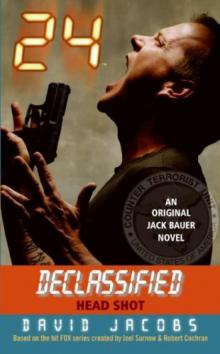 24 Declassified: Head Shot 2d-10
24 Declassified: Head Shot 2d-10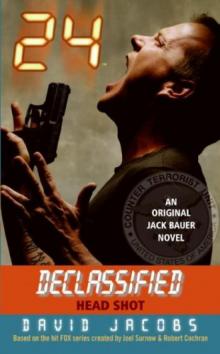 24 Declassified: 10 - Head Shot
24 Declassified: 10 - Head Shot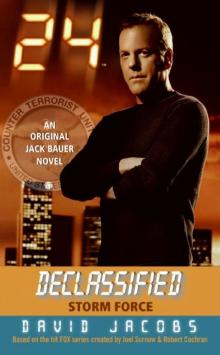 24 Declassified: 07 - Storm Force
24 Declassified: 07 - Storm Force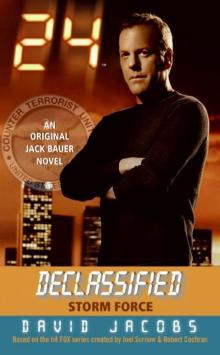 24 Declassified: Storm Force 2d-7
24 Declassified: Storm Force 2d-7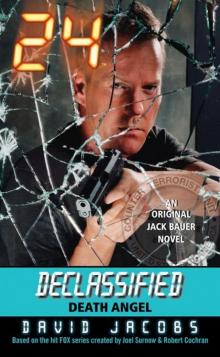 24 Declassified: Death Angel 2d-11
24 Declassified: Death Angel 2d-11